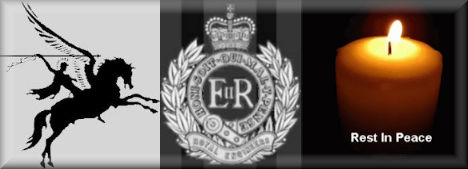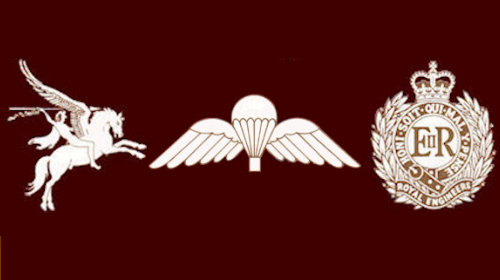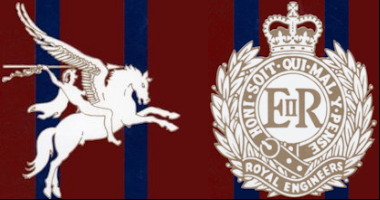
Roll of Honour
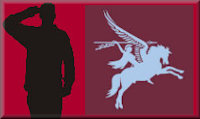
Sgt Norman Swift - 1st Air Troop & 1st Parachute Squadron RE
Part 1 - Obituary
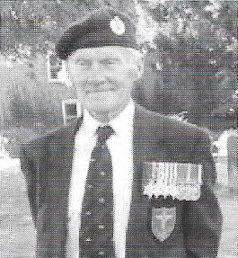 |
Norman Swift, the sole surviving member of the 1st Air Troop RE, passed away on Sunday 17th April 2011 at the age of eighty-nine years. He started his military career on 21 January 1937 as a fourteen year old when he arrived at Beachley Camp Chepstow. Three years later he completed his apprenticeship as a fitter and was posted to No 4 Training Regiment on 16th January 1940. There he completed his Field Engineer course ready to join a regular field squadron. In November 1941 volunteers were called for to form a new unit, the 1st Air Troop RE. This small unit of thirty-five men was to be the for-runner of the 1st Parachute Squadron RE. With parachuting in its infancy and very much at the experimental stage, these volunteers knew nothing of the dangers of jumping from aeroplanes with untried techniques and unsuitable aircraft, where even some of the RAF instructors had still not made their first parachute decent. |
In June 1942 the 1st Air Troop was increased in number to become the fully-fledged 1st Parachute Squadron RE. Those members of 1st Air Troop formed "A" Troop, which became the senior troop.
In June 1942 Norman, with his comrades of 1st Squadron RE, sailed for North Africa as part of the newly formed 1st Parachute Brigade, to be tested in battle against the Germans for the first time. For the next eighteen months the sapper squadron supported the 1st Para Brigade in all its major campaigns including Italy, Sicily, the Primosole Bridge and the capture of the bridge at Syracuse. During one of the battles to take a hill position, Norman was hit in the throat by a German bullet but fortunately it missed his wind pipe by a whisker and one of his best mates, "Pinky" White, applied a shell dressing, preventing any further loss of blood and probably saving his life.
The brigade returned to the UK in early 1944 and the 1st Parachute Squadron settled in the village of Donington in Lincolnshire. Frustrated at not being involved in the invasion of Europe on June 6th 1944 the squadron continued training, but boredom was beginning to show. After being called to standby for seventeen unspecified parachute operations the 1st Parachute Division, including 1st Para Sqn RE, were given the task of capturing the bridge over the lower Rhine at Arnhem in Holland. After the disastrous battle, Norman, along with many of his colleagues were taken prisoner and transported to Germany.
With his great friend Stan Halliwell, he volunteered, out of boredom and hunger, to work on a farm, and they came very close to being shot. Fed up helping the German war economy by working on a farm, the pair decided to sabotage some of the machinery by throwing rocks into the working parts. They were caught by the very irate elderly farmer and were made to stand by a barn ready to be shot. Norman and Stan pleaded with the farmer who then relented, maybe he knew the end of the war was only weeks away and did not want to be charged with a war crime. A few days later they walked away from the farm and after being freed by the Russians and made their own way back to the British lines. After a long dangerous journey they were picked up by American Forces, handed over to the British and returned to England by the RAF. Norman rejoined 1st Para Squadron as a training sergeant based in Aldershot. He decided to leave the Army and joined the Kent police force stationed in Tunbridge Wells.
Norman was a truly well respected person by all those privileged to meet this extremely modest man. Always with a warm smile and a strong handshake, ready to give help and advice he will be sadly missed by all those comrades and friends he came into contact with, but especially his devoted family who gave him tremendous support throughout his later years.
Rest in peace Norman.
Part 2 - A Tribute to Norman Swift, 1st Para Sqn RE
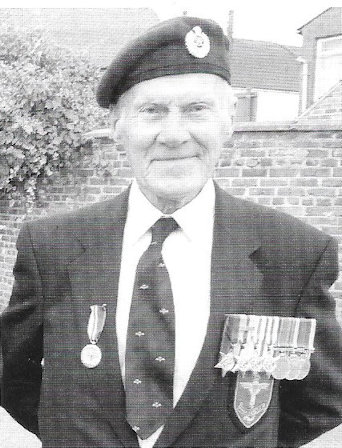 |
Norman was born in Melville Road, Maidstone, Kent on the 16th July 1922 to Harry & Edith Swift. Norman was the second of three children, having an older brother Jack, and younger sister Joan. As a young boy he enjoyed playing in the fields and orchards around Maidstone, especially in Mote Park. He went to Southborough Secondary School until he was given the choice at the age of 14 of either joining the East Kent Bus Company or going into boy service in the Army. Without hesitation he joined the army and was sent off to Chepstow School in Wales where he started a harsh and at first lonely induction into the pre-war British Army. His first meal consisted of a single piece of jam and bread, which was promptly stolen when an older boy next to him told him to close his eyes for prayers. The very next day he was initiated by the other boys by being "tossed in a blanket' which resulted in him receiving a broken finger - a difficult start for a young boy! |
Norman soon grew to love the life at Chepstow however and particularly excelled in gymnastics - until only a few years ago he could still attempt headstands in the garden to amuse his grandchildren & great-grandchildren! When he finished at Chepstow he joined the Royal Engineers and later volunteered for a new and experimental unit called 1st Air Troop RE, which was being formed alongside the fledgling Parachute Regiment. As the Parachute Regiment and its support troops was expanded and became a permanent part of the British Army, the troop was renamed 1st Parachute Squadron, Royal Engineers and Norman remained in the senior A Troop where he met many of his closest friends. Norman was the last surviving member of that original experimental 1st Air Troop RE.
Norman saw action in North Africa, Sicily & Italy and then returned to the UK in early 1944 where he met and fell in love with a blonde-haired & blue-eyed Land Army girl from Yorkshire, Violetta, who he married and lived happily with in Lincolnshire as the Squadron trained hard for what would eventually become Operation Market Garden, the attack on the Bridge at Arnhem in Holland.
At Arnhem, he was captured and made a prisoner of war after the 1st Para Squadron RE bravely held out against overwhelming odds for a total of four days before being forced to surrender. After some seven months in a German Prisoner of War Camp, he and his remaining comrades were set free by the advancing Russian Army, and rather than wait around, Norman and one of his best pals, Stan Halliwell, decided to walk back to the Allied lines, an amazing journey, fraught with dangers, especially when Stan tried to defend the small cart that they had commandeered from a troop of marauding Cossacks.
All his life he was fiercely proud of being part of the 1st Para Squadron RE and, though he rarely talked of the horrors that inevitability come with war, he shared some of the times which showed the dedication and selflessness that he and his comrades demonstrated.
After the war, Norman remained in the Army with the 1st Squadron as a training sergeant based in Aldershot where both of his daughters, Brenda & Pam, were born. He decided to leave the Army and joined Kent Police stationed in Tunbridge Wells for a while before deciding to leave the UK and move with the family, by now grown to three children with the addition of his Son David, to New Zealand where he worked briefly with the New Zealand Police in Wellington, Disgruntled with the boredom of his duties there (he always claimed that because he had *medals up' and still had a smart & soldierly bearing, he was the one always picked for sentry duty at Parliament House) he left and moved to the South Island to work for a small mining company.
Returning to the UK after a few years, the family lived at Bourne Hill Farm in Plaxtol with Uncle Bert, Aunt Min, Joy and Gill. Deciding that farming was not for him Norman rejoined the Kent Police and was stationed briefly at Northfleet, where his fourth child, Tim, was born before moving to Westerham where he became associated with looking after Chartwell, the official residence of Sir Winston Churchill. Norman and the family became great favourites of Churchill and were often invited to watch films in his private cinema, attend birthday parties, and were given free access to the grounds and gardens.
With a chance of promotion, Norman then moved to Maidstone where he worked in the Operations Room at the police headquarters and was promoted to Sergeant. He then moved to Sandwich and then Deal, where he developed a love of living close to the sea and beach fishing. He retired from the Kent Police after 25 years of service but sadly the retirement was marred by the death of his wife, and though he picked himself up, he always greatly missed her, right up until his own passing.
Deciding to move on, as he always advocated 'getting on with it' he joined the Civil Service in Dover Docks, met his second wife, Anne and acquired two stepchildren, Paul and Vicky. After Norman and Anne were married they bought a house in St Margaret's Bay where they lived happily until sadly Anne also died and left Norman alone again.
With a lot of persuasion, his daughters managed to get him to leave his beloved Kent and move to Sussex where he lived in modest bungalow in Battle with the most beautiful garden which he loved and tended passionately right up until his death.
He always said that he was amazed to find that he loved Sussex more than Kent, but put the fact down to having "come home' when he discovered that his mother had been born only a few mites away in Ninfield and had spent her childhood in Battle, Norman was so proud of his family - of his daughters and son through to his great grand children. He took an interest in each one of them and always wanted to know how they were getting on.
He was a man, who cared about the past as well as the future and had a strong sense of loyalty towards his army comrades and a deep pride for all they shared and achieved.
Norman was a warm and kind hearted person who was genuinely interested in and cared about other people. He was a very giving person who got a lot of personal satisfaction from the happiness of others. He could bring the best out in others and, with all of his family, always encouraged and supported them to be the best that they could be.
Norman had a full, creative and productive life. I know each one of us has been touched by the love he has shown us over the years. Knowing him has made each one of us a better person and our memories of him will always be with us.
For some of us it will be as a father, for some, a grandfather, for others, a friend or comrade. For all of us it will be as someone whose special life touched our own and we are all the more blessed for knowing him. Finally, as a friend of his son and daughter in law said on hearing of his death, Death, while very sad, is only regrettable when life is full of lost opportunities - that surely, could never be said of Norman
